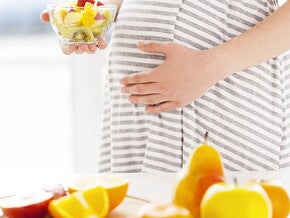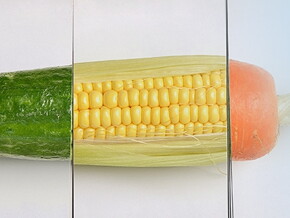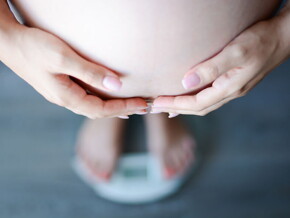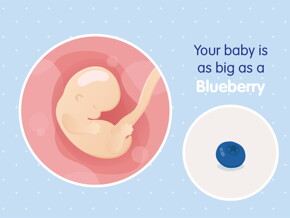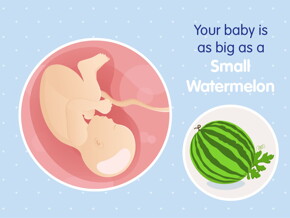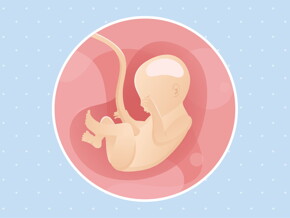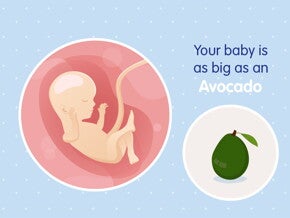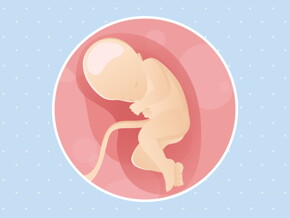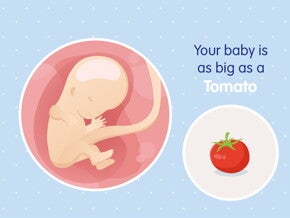Food takes on a whole new meaning when you’re a mom-to-be. Not only can it boost your energy levels and sense of well-being during the often exhausting nine months of pregnancy, but it also directly influences the health of the baby growing and developing inside you. In fact, the nutrition your child receives starting from conception through to when their two years of age, can affect the extent to which your child may develop chronic conditions such as obesity, diabetes, and cardiovascular disease in the future. This is the concept of “early nutrition and metabolic programming”.
Eat today for their tomorrow
“This idea of early nutrition programming is all about giving your unborn baby the best start in life,” says Dr. Marco Turini, PhD, former Head of Global Scientific Affairs at Nestlé Nutrition, Switzerland. “During these nine months, the nutrition, and environment your baby experiences influences how your baby grows and develops before birth, and can program his growth and health for years to come. This requires special attention to provide adequate nutritional care. That’s why gaining the appropriate amount of weight and choosing foods rich in nutrients are so important for your baby’s health.”
Why your weight matters
The problem of childhood obesity is one of best reasons for maintaining your own healthy weight gain and eating a balanced diet while you’re pregnant. Excessive weight gain during pregnancy can lead to an approximate 40% increased risk of childhood obesity.
Gaining too much weight during pregnancy can also lead to a baby that is too large at birth. Contrary to some beliefs, an extra-large baby at birth is not healthier than a baby born at a normal and healthy weight. In addition, a high birth weight can indicate a baby will have a greater chance of becoming too heavy during his toddler and childhood years. As well as leading to other problems such as diabetes, childhood obesity often leads to adult obesity. A second theory for why some children become obese relates to the weight gain of your baby after birth. Babies who gain weight rapidly are at increased risk of later obesity.
Here are some simple ideas for super-charging your nutrient intake:
EAT… pulses
Pulses are the affordable, delicious, and protein-packed foods you may know better as beans. Eating more pulses, making a lentil salad or adding some chickpeas to your stew at home, for example, will add to your nutrient intake. Pulses include dried beans, peas, lentils, and chickpeas. Along with fish, chicken, red meat, spinach, and dried fruit, pulses also contain iron—a mineral vital for your baby’s neural and red blood cell development. They’re also good sources of protein, your baby’s building blocks for so many things from enzymes to antibodies.
COOK… vegetables
Eating your vegetables has never been so important. The dark, green leafy types such as kale and spinach are especially rich in folate. Vital in the very early weeks, folate aids your baby’s neural tube develop into their spine and brain. Think about dishing up some carrots, squash, or sweet potatoes with your Sunday lunch too as they all contain vitamin A, which is important for vision and immune health.
DRINK… milk
Milk contains calcium, which helps build strong bones and teeth. During pregnancy, you need up to 1200 mg calcium a day, and a glass of milk (240 ml) delivers about 300 mg. Low fat milks (skim, 1%, and 2%) contain the same amount of calcium as whole (homogenized) milk with fewer calories.
ENJOY… oily fish
Fatty fish, such as salmon and sardines, provides DHA (docosahexaenoic acid), an omega-3 fatty acid that helps support your baby’s brain and eye development. Getting enough DHA can be tricky, so if you’re unsure—or you’re not a fish fan—speak to your healthcare provider about a supplement containing DHA.
BOIL… eggs
Whether you like them boiled, scrambled, or poached, eggs are a great source of protein. A building block of your baby’s body, protein helps to develop almost everything from muscles to collagen. During pregnancy, your protein needs increase from about 50 to 71 g per day. To put that in context of what’s on your plate, a boiled egg has about 7 g of protein; a 30 g portion of cheese and a 240 ml cup of milk each has 7-8 g of protein; and a 85 g filet of salmon contains 23 g of protein. So, one egg can give you about the same amount of protein as 30g of meat, fish, or cheese, or a glass of milk.
STAY… active
Keeping active by doing some gentle exercise such as walking, swimming, or yoga may help to keep your weight gain under control. Current Canadian guidelines for healthy pregnant women recommend at least 150 minutes of moderately intense physical exercise per week, spread over at least 3 days. Always check with your healthcare provider about exercise during pregnancy.
Sources
Black RE, Victora CG, Walker SP et al. Maternal and child undernutrition and overweight in low-income and middle-income countries. Lancet 2013; 382:427-51.
De Kroon ML. The Terneuzen birth cohort: BMI changes between 2 and 6 years correlate strongest with adult overweight. PLoS One 2010; 5:e9155.
Dodd JM. Dietary and lifestyle advice for pregnant women who are overweight or obese: the LIMIT randomized trial. Ann Nutr Metab 2014; 64:197-202.
IOM (Institute of Medicine) and NRC (National Research Council). Weight Gain During Pregnancy: Reexamining the Guidelines. Washington, D.C.: The National Academies Press, 2009.
Jiang H, Qian X, Lynn H, Fan Y, Jiang H, He F, He G. Can physical activity reduce excessive gestational weight gain? Findings from a Chinese urban pregnant women cohort study. Int J Behav Nutr Phys Act 2012; 9:12. doi: 10.1186/1479-5868-9-12.
Koletzko B, Brands B, Poston L, Godfrey K, Demmelmair H. Early nutrition programming of long-term health. Proc Nutr Soc 2012; 71:371-8.
Langley-Evans S. Nutritional programming of disease: unravelling the mechanism. J Anat 2009; 215:36-51.
Mamun AA, Mannan M, Doi SA. Gestational weight gain in relation to offspring obesity over the life course: a systematic review and bias-adjusted meta-analysis. Obes Rev 2014; 15:338-47.
Mottola MF et al., 2018. No. 367-2019 Canadian guideline for physical activity throughout pregnancy. JOGC. 401(11):1528-1537.
Nehring I, Lehmann S, von Kries R. Gestational weight gain in accordance to the IOM/NRC criteria and the risk for childhood overweight: A meta-analysis. Pediatr Obes 2012; 8:218-24.
Ong KK, Loos RJ. Rapid infancy weight gain and subsequent obesity: systematic reviews and hopeful suggestions. Acta Paediatr 2006; 95:904-8.
Ramakrishnan U, Grant F, Goldenberg T, Zongrone A, Martorelli R. Effect of women’s nutrition before and during early pregnancy on maternal and infant outcomes: A systematic review. Paediatric Perinat Epidemiol 2012; 26 (Suppl 1):285–301.
Reynolds CM, Gray C, Li M et al. Early life nutrition and energy balance disorders in offspring in later life. Nutrients 2015; 7:8090-11.
Canadian Pulse Industry. What are pulses? What are Pulses | Half-Cup Habit Accessed April 2021.









